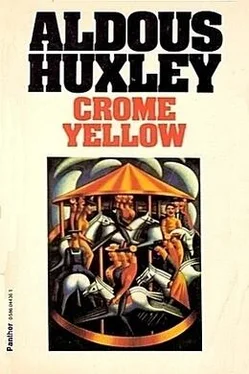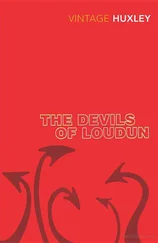A gate slammed; there was a sound of heavy footsteps.
"Morning, Rowley!" said Henry Wimbush.
"Morning, sir," old Rowley answered. He was the most venerable of the labourers on the farm—a tall, solid man, still unbent, with grey side–whiskers and a steep, dignified profile. Grave, weighty in his manner, splendidly respectable, Rowley had the air of a great English statesman of the mid–nineteenth century. He halted on the outskirts of the group, and for a moment they all looked at the pigs in a silence that was only broken by the sound of grunting or the squelch of a sharp hoof in the mire. Rowley turned at last, slowly and ponderously and nobly, as he did everything, and addressed himself to Henry Wimbush.
"Look at them, sir," he said, with a motion of his hand towards the wallowing swine. "Rightly is they called pigs."
"Rightly indeed," Mr. Wimbush agreed.
"I am abashed by that man," said Mr. Scogan, as old Rowley plodded off slowly and with dignity. "What wisdom, what judgment, what a sense of values! 'Rightly are they called swine.' Yes. And I wish I could, with as much justice, say, 'Rightly are we called men.'"
They walked on towards the cowsheds and the stables of the cart–horses. Five white geese, taking the air this fine morning, even as they were doing, met them in the way. They hesitated, cackled; then, converting their lifted necks into rigid, horizontal snakes, they rushed off in disorder, hissing horribly as they went. Red calves paddled in the dung and mud of a spacious yard. In another enclosure stood the bull, massive as a locomotive. He was a very calm bull, and his face wore an expression of melancholy stupidity. He gazed with reddish–brown eyes at his visitors, chewed thoughtfully at the tangible memories of an earlier meal, swallowed and regurgitated, chewed again. His tail lashed savagely from side to side; it seemed to have nothing to do with his impassive bulk. Between his short horns was a triangle of red curls, short and dense.
"Splendid animal," said Henry Wimbush. "Pedigree stock. But he's getting a little old, like the boar."
"Fat him up and slaughter him," Mr. Scogan pronounced, with a delicate old–maidish precision of utterance.
"Couldn't you give the animals a little holiday from producing children?" asked Anne. "I'm so sorry for the poor things."
Mr. Wimbush shook his head. "Personally," he said, "I rather like seeing fourteen pigs grow where only one grew before. The spectacle of so much crude life is refreshing."
"I'm glad to hear you say so," Gombauld broke in warmly. "Lots of life: that's what we want. I like pullulation; everything ought to increase and multiply as hard as it can."
Gombauld grew lyrical. Everybody ought to have children—Anne ought to have them, Mary ought to have them—dozens and dozens. He emphasised his point by thumping with his walking–stick on the bull's leather flanks. Mr. Scogan ought to pass on his intelligence to little Scogans, and Denis to little Denises. The bull turned his head to see what was happening, regarded the drumming stick for several seconds, then turned back again satisfied, it seemed, that nothing was happening. Sterility was odious, unnatural, a sin against life. Life, life, and still more life. The ribs of the placid bull resounded.
Standing with his back against the farmyard pump, a little apart, Denis examined the group. Gombauld, passionate and vivacious, was its centre. The others stood round, listening—Henry Wimbush, calm and polite beneath his grey bowler; Mary, with parted lips and eyes that shone with the indignation of a convinced birth–controller. Anne looked on through half–shut eyes, smiling; and beside her stood Mr. Scogan, bolt upright in an attitude of metallic rigidity that contrasted strangely with that fluid grace of hers which even in stillness suggested a soft movement.
Gombauld ceased talking, and Mary, flushed and outraged, opened her mouth to refute him. But she was too slow. Before she could utter a word Mr. Scogan's fluty voice had pronounced the opening phrases of a discourse. There was no hope of getting so much as a word in edgeways; Mary had perforce to resign herself.
"Even your eloquence, my dear Gombauld," he was saying—"even your eloquence must prove inadequate to reconvert the world to a belief in the delights of mere multiplication. With the gramophone, the cinema, and the automatic pistol, the goddess of Applied Science has presented the world with another gift, more precious even than these—the means of dissociating love from propagation. Eros, for those who wish it, is now an entirely free god; his deplorable associations with Lucina may be broken at will. In the course of the next few centuries, who knows? the world may see a more complete severance. I look forward to it optimistically. Where the great Erasmus Darwin and Miss Anna Seward, Swan of Lichfield, experimented—and, for all their scientific ardour, failed—our descendants will experiment and succeed. An impersonal generation will take the place of Nature's hideous system. In vast state incubators, rows upon rows of gravid bottles will supply the world with the population it requires. The family system will disappear; society, sapped at its very base, will have to find new foundations; and Eros, beautifully and irresponsibly free, will flit like a gay butterfly from flower to flower through a sunlit world."
"It sounds lovely," said Anne.
"The distant future always does."
Mary's china blue eyes, more serious and more astonished than ever, were fixed on Mr. Scogan. "Bottles?" she said. "Do you really think so? Bottles…"
Mr. Barbecue–Smith arrived in time for tea on Saturday afternoon. He was a short and corpulent man, with a very large head and no neck. In his earlier middle age he had been distressed by this absence of neck, but was comforted by reading in Balzac's "Louis Lambert" that all the world's great men have been marked by the same peculiarity, and for a simple and obvious reason: Greatness is nothing more nor less than the harmonious functioning of the faculties of the head and heart; the shorter the neck, the more closely these two organs approach one another; argal…It was convincing.
Mr. Barbecue–Smith belonged to the old school of journalists. He sported a leonine head with a greyish–black mane of oddly unappetising hair brushed back from a broad but low forehead. And somehow he always seemed slightly, ever so slightly, soiled. In younger days he had gaily called himself a Bohemian. He did so no longer. He was a teacher now, a kind of prophet. Some of his books of comfort and spiritual teaching were in their hundred and twentieth thousand.
Priscilla received him with every mark of esteem. He had never been to Crome before; she showed him round the house. Mr. Barbecue–Smith was full of admiration.
"So quaint, so old–world," he kept repeating. He had a rich, rather unctuous voice.
Priscilla praised his latest book. "Splendid, I thought it was," she said in her large, jolly way.
"I'm happy to think you found it a comfort," said Mr. Barbecue–Smith.
"Oh, tremendously! And the bit about the Lotus Pool—I thought that so beautiful."
"I knew you would like that. It came to me, you know, from without." He waved his hand to indicate the astral world.
They went out into the garden for tea. Mr. Barbecue–Smith was duly introduced.
"Mr. Stone is a writer too," said Priscilla, as she introduced Denis.
"Indeed!" Mr. Barbecue–Smith smiled benignly, and, looking up at Denis with an expression of Olympian condescension, "And what sort of things do you write?"
Denis was furious, and, to make matters worse, he felt himself blushing hotly. Had Priscilla no sense of proportion? She was putting them in the same category—Barbecue–Smith and himself. They were both writers, they both used pen and ink. To Mr. Barbecue–Smith's question he answered, "Oh, nothing much, nothing," and looked away.
Читать дальше











